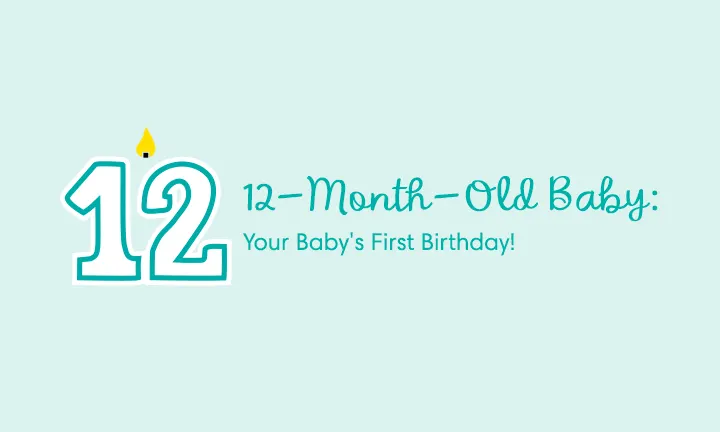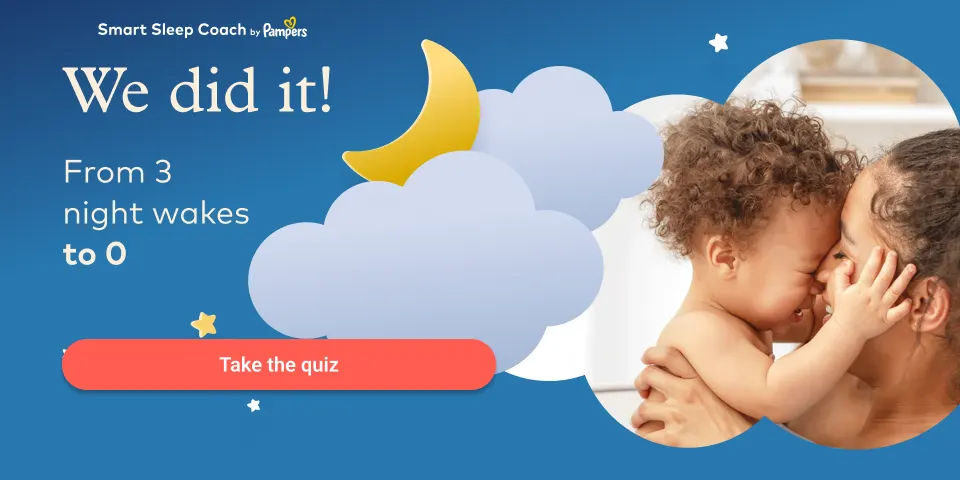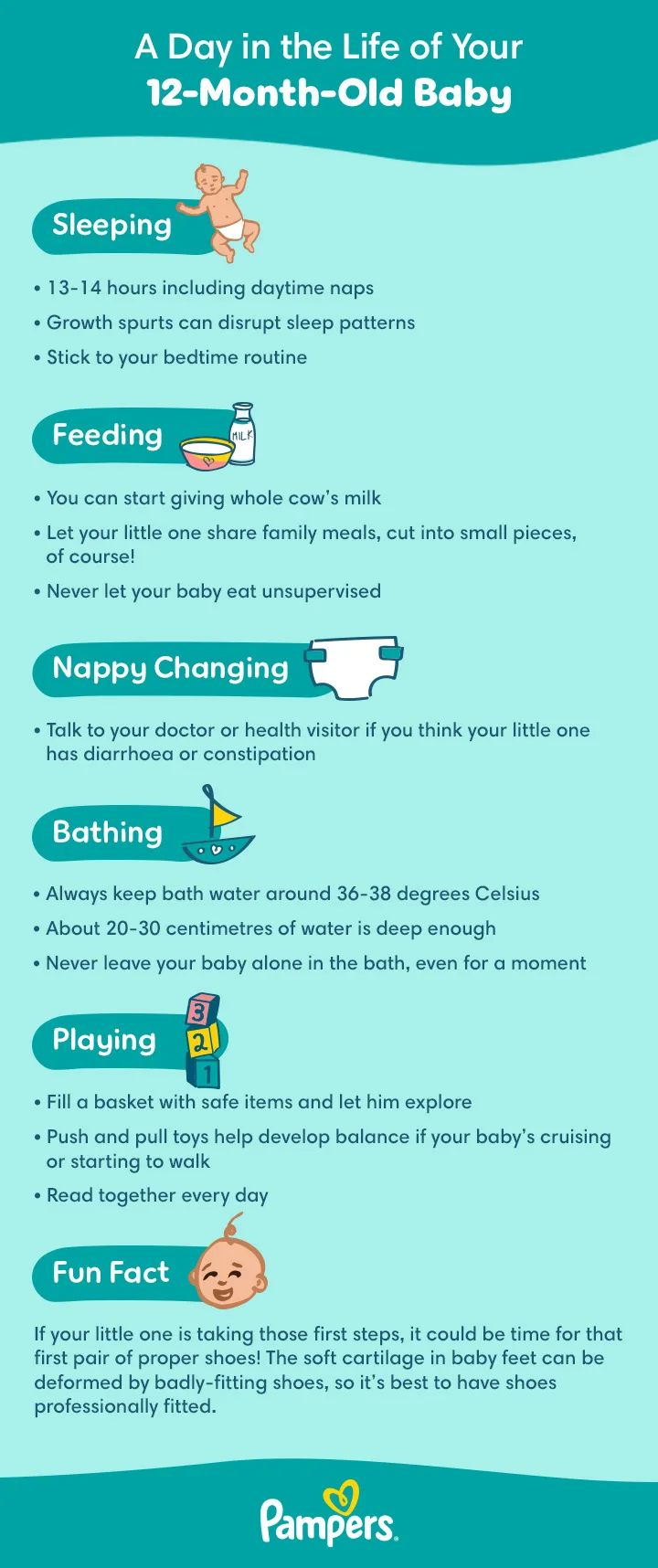12-Month-Old-Baby: Your Baby's First Birthday!
How time flies! A year has gone by, and your baby has already grown and learned so much in these first twelve months. But there’s much more yet to come! We’ll let you know what sort of foods your 12-month-old baby might like to try, how much sleep your little one needs and how to best support his or her development at this exciting time.

Baby Development Milestones
There’s plenty to get excited about as your one-year-old transitions from being a baby to a toddler. Discover some of the milestones that might be coming up around this time.
Growth and Physical Development: Watch Him Grow
You may have noticed a slight slowing in your child’s growth recently. This is normal as babies tend to gain the most weight in the first six to nine months.
There’s a lot of variation in growth rates between children, but your baby’s paediatrician will be checking your baby’s growth using baby growth charts at your little one’s regular health and development reviews, to make sure everything’s on track.
Meanwhile your budding toddler’s dexterity and coordination are improving all the time. You can help this along by encouraging two-handed tasks, such as mixing in a bowl, stacking building blocks or unscrewing the tops of plastic bottles. Action songs with hand movements, like ‘Incy-Wincy Spider’ or ‘One Potato, Two Potatoes’ could also be a hit!
Senses: Bright-eyed and Curious
Your baby’s vision is improving all the time, and he or she may be homing in on really small things now, such as little scraps of food or bits of fluff. Your child may also actively look for hidden objects, such as a toy that has rolled out of sight.
If you have a health and development review coming up, you might be asked about your child’s eyesight. Eye tests aren’t usually conducted at this stage, but your GP or health visitor can arrange a more detailed examination if you have any concerns.
Movement: Cruising and Balancing
Your 12-month-old baby is either getting ready to or already starting to explore the world from a different angle − standing unassisted or walking while holding onto furniture.
Although there’s no knowing exactly when they’ll happen, your little one’s first tottering steps will be one of the most memorable milestones in your child’s early development.
At this stage, your baby may already be able to pull him or herself up to a standing position, or may even be taking a few steps by holding onto the furniture for support. This is known as ‘cruising’. If your baby is not ready for this yet, try to be patient, this skill will emerge sooner or later.
Your baby’s first few independent steps might lead to a few falls. This is all part of the learning process, but do make sure that you’ve created a safe environment for your toddler-to-be, and supervise your little one closely.
Cognitive Development: Practicing Sounds and Words
Your child can recognise his or her own name, and may also respond to common expressions like ‘no’ or ‘bye bye’ without the need for any other prompts from you, such as shaking your head or waving goodbye.
Around this time, you might also notice a conversation-like rhythm to your baby’s babbling, and maybe even one or two recognisable words. Help with learning new words by pointing at things and naming them using phrases like ‘look, a cat!’
Games like ‘peek-a-boo’ and ‘round and round the garden’ can help teach your little one important conversation skills like turn-taking and paying attention.

How to Support Your Baby's Development
If your baby hasn’t started cruising yet, he or she may not feel quite ready yet. You might like to try this method of giving some gentle encouragement:
Sit on your heels in front of a stable coffee table or low sofa, with some toys on it.
Place your baby in a seated position on your lap with his or her feet on the floor.
Help your little one to reach out and hold onto the furniture.
Put your hands around your baby’s hips and help him or her to stand by gently moving them forwards as your little one straightens those little legs.
Once your baby is taking some tentative steps, but before the skill of toddling unaided has been mastered, you could encourage him or her to walk with a push-along walker or ‘toddle truck’, or while holding onto your hands.
Sit-in walkers generally aren’t recommended, but if you do have one, experts advise limiting its use to 10 minutes a day and supervising your child closely to prevent accidents.
Here are some more things you can try to aid your baby’s development:
Give your little one plenty of space to move around. Supervised time on the floor remains important, both on the back and tummy.
Once your child starts cruising or walking independently, you can start teaching him or her how to climb on and off furniture and use stairs, with your close supervision of course.
Toys and books that talk, squawk or make other noises can give your baby’s listening skills a boost.
Help your baby learn new words, such as parts of the body and other familiar objects by teaching action games and songs like ‘head, shoulders, knees and toes’. Another way to boost your little one’s vocabulary is to offer choices, such as ‘do you want an apple or a banana?’
Correcting mistakes in a positive and encouraging way is beneficial, too. For example, if your child gets a word wrong and ‘cat’ comes out as ‘ca’, say something like ‘That’s right, it’s a cat!’

Feeding Your 12-Month-Old Baby
At 12 months your baby needs 3 meals a day (and maybe a couple of snacks in between). Your baby might be ready to start to come off the baby food and continue to explore some of the foods that everyone else in the family is eating. Your baby’s world grows a little with every new flavour and texture that he or she experiences.
There are some dos and don’ts associated with feeding your baby solids, which may seem a little daunting at first. These will soon become second nature.
Here are some important things to keep in mind:
Salty food is a no-no for a one-year-old baby, as too much salt isn’t good for little kidneys. It’s worth checking food labels, as things like stock cubes or gravy granules can contain more salt than you think. Foods like bacon, sausages, ready meals and takeaway meals can also be salty.
Sugar (including sugary drinks and fruit squashes) is best avoided, as it’s bad for baby teeth. Fruit juices and smoothies also contain natural sugars, but if you do give them in moderation it’s better to have them at mealtimes, in diluted form, to cut down on the risk of tooth decay.
Anything that might cause choking if eaten whole, like nuts, seeds or grapes, needs to be crushed or ground or cut into smaller pieces.
Eggs without a ‘red lion’ stamp may not be safe if eaten raw or undercooked, for example as an ingredient in homemade mayonnaise.
Introducing Cow’s Milk
Your child is now ready to start drinking cow’s milk, which is an important source of the energy and the calcium your little one needs to grow strong, healthy bones. At one year old, a milk intake of 350 ml to 600 ml of whole cow’s milk a day, or two servings of dairy foods like cheese or yoghurt is good for your baby.
As with all new foods that contain potential allergens it’s best to start with small amounts at first, and talk to your paediatrician if you notice any signs of an allergic reaction such as tummy pain, vomiting or rashes.
Keep in mind that experts recommend giving whole milk and full-fat dairy products until your toddler is at least two. This is because low-fat alternatives don’t contain enough energy for a growing one-year-old.
If you’re breastfeeding, it’s fine to keep going for as long as you and your baby like. Your baby will simply take as much or as little breast milk as necessary in addition to the new main sources of nutrition.
If you want to keep using formula, at the age of 1 year old your baby needs to switch to ‘growing up milk’ or ‘toddler milk’, but it’s strongly advised to ask your health visitor about this.

How Much Sleep Does a 12-Month-Old Baby Need?
Your child now needs 12 to 15 hours of sleep a day, including daytime naps. You’ve probably already noticed how sleep patterns can change as your baby grows. All sorts of things can affect this, from growth spurts and teething to illnesses. Plus, with so many exciting things to explore who could blame your little one for just wanting to stay awake a little longer?
There are plenty of things you can do to help your baby (and you) get a better night’s sleep:
Keep to your bedtime routine. This helps your child learn when it’s time to quieten down and prepare for bed. A bedtime routine could start about half an hour before bedtime, and involve calming activities like a bath, brushing teeth, a change into fresh pyjamas, a story and dimming the lights in the room.
Create a good environment for sleeping. Your child will be able to sleep best in a place where he or she feels safe and secure. The temperature of the room, the noise levels and lighting are all important.
Dim the lights. Darkness is generally good for getting off to sleep, because it triggers production of the sleep hormone, melatonin; but if your child is scared or anxious in the dark it’s fine to use a nightlight. It also helps if the bedroom is set aside as a space for sleep and not play.
Keep distractions to a minimum. If the presence of certain toys in the room excites your baby, then ‘out of sight, out of mind’ is probably the best policy.
Be active when awake. If your child doesn’t get enough physical exercise during the day, he or she might not be tired enough when it’s time for bed, so the more opportunities he has to move around and play during the day, the better the chances of a sound night’s sleep.

A Day in the Life of Your Baby
Every baby and every family is different, but here's a look at what your average day could look like with a 12-month-old baby in the house.

Your Baby's Health: Breathing and Allergy Issues
As your baby starts exploring the world more and more actively, there’s a chance that one or two things he or she finds in it won’t agree with her. Here are a few of the issues that may affect your baby at this age:
Food allergies. Certain foodstuffs including cow’s milk, eggs, foods with gluten in them (for example, bread or other things made with wheat, barley or rye), nuts, soy and fish can trigger an allergic reaction in some children. For this reason, it’s advisable to introduce them a little at a time. If you do notice any signs of an allergy like diarrhoea or vomiting, coughing, wheezing or rashes, especially after eating, tell your health visitor or GP, who may refer you to a dietician. Learn more about food intolerances and allergies in children .
Diarrhoea and constipation. With all the new foods, and possibly the addition of cow's milk to her diet, you may notice occasional diarrhoea or constipation. Hard stools or crying when making bowel movement can be symptoms of constipation. If you notice these signs, talk to your GP, as treatment differs at different ages. Ways to prevent constipation include giving your baby a variety of foods, especially fruit and vegetables that are high in fibre, making sure he or she has plenty to drink and providing time for lots of physical activity.
Asthma. This chronic condition occurs when the airways in the lungs are inflamed and constricted. Symptoms of asthma can include wheezing, shortness of breath and coughing. The symptoms often occur at night, and can be triggered by allergies or physical activity. Only your GP can diagnose and treat asthma so if you notice these kinds of symptoms it’s best to seek professional help right away.
Allergic rhinitis. A runny nose and red, itchy eyes are a few of the common symptoms of allergic rhinitis, which is caused by an immune reaction to allergens in the air. Perhaps the best known of these is hay fever, which is being allergic to pollen from plants and trees. Other allergens include house dust, mould spores and pet hair. Symptoms may last for weeks or months, and may be seasonal depending on the trigger. Ask your GP for advice if you suspect that your baby may be allergic to something in the air.

FAQs at a Glance
All babies develop at a different pace, but by 12 months your baby might be able to
- look for hidden objects (like a toy that’s rolled out of sight, or your face in a game of peekaboo)
- home in on the correct picture in a book when you name it
- pick up small objects or pieces of food using his thumb and finger
- put things into a container and take them out again
- sit up
- pull him or herself up to a standing position
- start trying to cruise (walking by holding on to furniture) or even walk
- start to form recognisable syllables or say some words.

Your Life as a Parent: Creating Lasting Memories
The past year may have whizzed past, but so much has happened in that short space of time! You’re probably taking baby photos like a pro and now have a phone, camera or hard drive full of photographs and videos. Don’t forget to back them up every now and then. For example, save them to a USB or upload them to a secure, cloud-based service.
You might also like turn all these precious memories into something you can hold in your hand or give as a gift. For example, print a few of your best photos and frame them or select your favourites and make a photobook or album.
If you’ve got some physical keepsakes lying around, such as a lock of hair from the first haircut or your baby’s name bracelet from the hospital, you might like to keep them safe in a scrapbook or memory box.
Of course, in today’s digital age, it’s getting easier all the time to create your own professional-looking photomontages, video clips and slideshows in a digital format, which you can send to even the most faraway friends and relatives.
First Birthday Fun
Your baby’s first birthday is just around the corner. This is an exciting milestone, so you’re probably getting ready to celebrate it in style. You might like to choose a theme for the party, such as your little one’s favourite animal or storybook character. Having a theme makes it easier to design invitations and choose decorations. Deciding what kind of food or cake to serve might also be easier if you have a theme.
In addition to food for the adults, have plenty of healthy finger foods for the little ones to enjoy. If you’re planning to invite other babies or toddlers, it’s a good idea to ask beforehand if they have any food allergies or intolerances.
When it comes to entertainment, bubbles are always a hit with small children and finger painting can be great fun too, if a little messy! If you’re inviting other people with children, it’s good to have a soft play area for the littlest ones and some suitable activities lined up for any older siblings as well.
Checklist for This Month
Dental hygiene is important now that your baby probably has at least one tooth, and more are on the way. Brushing teeth and gums twice a day with a baby brush and fluoride toothpaste is essential to helping prevent tooth decay.
Schedule an appointment at the dentist. Dental treatment is free for children who are eligible for NHS care, and experts recommend taking your little one for a first dental check-up at the age of 12 months, if not earlier.
If your little one’s started cruising or walking, it’s time to think about going shopping for that first pair of shoes! It’s best to have them professionally fitted, to make sure you get the best fit. The first shoes should have a lightweight, flexible sole and soft uppers, and be secured with laces or a buckle. Natural materials are ideal as they prevent sweating, which can lead to fungal infections.
Now that your baby’s getting more mobile, it’s time to double-check your home’s baby proofing.
Make an appointment for your baby’s 9-12 month health and development review if you haven’t already been. Before the review you’ll be sent an ‘Ages and Stages Questionnaire’ to fill in. Don’t worry if you can’t answer all the questions Your health visitor will be able to help you with anything you’re unsure about.
Talk to you your health visitor about the next round of jabs that will be coming up in the months following your baby’s first birthday. Most of these will be boosters to strengthen the effect of previous inoculations, but one will give protection against a new set of diseases: measles, mumps and rubella. The next health and development review is a good opportunity to talk to your health visitor about your vaccinations.
For even more information, sign up to get our regular emails:
12 month old baby - checklist





